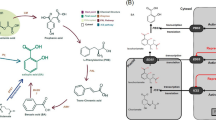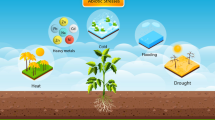Abstract
Sweetpotato is an important crop that is very sensitive to low temperatures. Mitogen-activated protein kinase (MAPK) is involved in plant growth and development and is responsive to many environmental stresses. IbMPK3 is strongly regulated by low-temperature stress. We studied the function of IbMPK3 and how it may enhance the adaptability of sweetpotato plants to low-temperature stress. Transgenic sweetpotato plants overexpressing IbMPK3 were generated, and three transgenic lines with the highest expression level of IbMPK3 were used for low-temperature tests. Transgenic plants exposed to low-temperature stress had less damage associated with higher photosynthesis efficiency and less cell membrane damage. IbMPK3-overexpressing transgenic plants could modulate reactive oxygen species (ROS) metabolism with lower levels of O2− and H2O2 accumulation and higher enzymatic activities than WT plants. Transcript expression levels of some ROS-related genes (IbCAT, IbCu-ZnSOD, and IbCAT) and stress-responsive genes (IbP3B and IbCOR27) were significantly upregulated in transgenic plants compared to WT. These results indicate that IbMPK3 has an important role in sweetpotato response to low temperatures.





Similar content being viewed by others
Abbreviations
- MAPK:
-
Mitogen-activated protein kinase
- MAPKKK/ MEKK:
-
MAPK kinase kinase
- MAPKK/ MKK:
-
MAPK kinase
- qRT-PCR:
-
Quantitative Real-time PCR
- O2 − :
-
Superoxide
- H2O2 :
-
Hydrogen peroxide
- MDA:
-
Malondialdehyde
- APX:
-
Ascorbate peroxidase
- SOD:
-
Superoxide dismutase
- POD:
-
Peroxisome
- CAT:
-
catalase
- DREB1/CBF:
-
Dehydration-responsive element-binding/C-repeat-binding factor
- ICE:
-
Inductor of CBF expression 1
- TPP:
-
Trehalose-6-phosphate phosphatase
References
Abei H (1984) Catalase in vitro. Method Enzymol 105:121
Agarwal PK, Agarwal P, Reddy MK, Sopory SK (2006) Role of DREB transcription factors in abiotic and biotic stress tolerance in plants. Plant Cell Rep 25:1263–1274
Bindschedler LV, Minibayeva F, Gardner SL, Gerrish C, Davies DR, Bolwell GP (2001) Early signalling events in the apoplastic oxidative burst in suspension cultured French bean cells involve cAMP and Ca2+. New Phytol 151:185–194
Bovell-Benjamin AC (2007) Sweet potato: a review of its past, present, and future role in human nutrition. Adv Food Nutr Res 52:1–59
Bradford MM (1976) A rapid and sensitive method for the quantitation of microgram quantities of protein utilizing the principle of protein-dye binding. Anal Biochem 72:248–254
Chinnusamy V, Zhu JK, Sunkar R (2010) Gene regulation during cold stress acclimation in plants. Methods Mol Biol 639:39–55
Curtis MD, Grossniklaus U (2003) A gateway cloning vector set for high-throughput functional analysis of genes in planta. Plant Physiol 133:462–469
Dhindsa RS, Pamela PD, Thorpe TA (1981) Leaf senescence: correlated with increased levels of membrane permeability and lipid peroxidation, and decreased levels of superoxide dismutase and catalase. J Exp Bot 93–101
Drobnis EZ, Crowe LM, Berger T, Anchordoguy TJ, Overstreet JW, Crowe JH (1993) Cold shock damage is due to lipid phase transitions in cell membranes: a demonstration using sperm as a model. J Exp Zool Part A 265:432–437
Fan W, Zhang M, Zhang H, Zhang P (2012) Improved tolerance to various abiotic stresses in transgenic sweet potato (Ipomoea batatas) expressing spinach betaine aldehyde dehydrogenase. PLoS ONE 7:e37344
Fan W, Deng G, Wang H, Zhang H, Zhang P (2015) Elevated compartmentalization of Na+ into vacuoles improves salt and cold stress tolerance in sweet potato (Ipomoea batatas). Physiol Plant 154:560–571
Finkel T, Holbrook NJ (2000) Oxidants, oxidative stress and the biology of ageing. Nature 408:239–247
Fujita M, Fujita Y, Noutoshi Y, Takahashi F, Narusaka Y, Yamaguchi-Shinozaki K, Shinozaki K (2006) Crosstalk between abiotic and biotic stress responses: a current view from the points of convergence in the stress signaling networks. Curr Opin Plant Biol 9:436–442
Gill SS, Tuteja N (2010) Reactive oxygen species and antioxidant machinery in abiotic stress tolerance in crop plants. Plant Physiol Biochem 48:909–930
Gudesblat GE, Iusem ND, Morris I (2007) Guard cell-specific inhibition of Arabidopsis MPK3 expression causes abnormal stomatal responses to abscisic acid and hydrogen peroxide. New Phytol 173:713–721
Huner NPA, Öquist G, Hurry VM, Krol M, Falk S, Griffith M (1993) Photosynthesis, photoinhibition and low temperature acclimation in cold tolerant plants. Photosynth Res 37:19–39
Ichimura K, Mizoguchi T, Irie K, Morris P, Giraudat J, Matsumoto K, Shinozaki K, Communications BR (1998) Isolation of ATMEKK1 (a MAP kinase kinase kinase)-interacting proteins and analysis of a MAP kinase cascade in Arabidopsis. Biochem Biophys Res Commun 253:532–543
Ichimura K, Mizoguchi T, Yoshida R, Yuasa T, Shinozaki K (2010) Various abiotic stresses rapidly activate Arabidopsis MAP kinases ATMPK4 and ATMPK6. Plant J 24:655–665
Ji CY, Jin R, Xu Z, Kim HS, Lee CJ, Kang L, Kim SE, Lee HU, Lee JS, Kang CH, Chi YH, Lee SY, Xie YP, Li HM, Ma DF, Kwak SS (2017) Biology, overexpression of Arabidopsis P3B increases heat and low temperature stress tolerance in transgenic sweetpotato. BMC Plant Biol 17:139
Jin R, Kim BH, Ji CY, Kim HS, Li HM, Ma DF, Kwak SS (2017) Overexpressing IbCBF3 increases low temperature and drought stress tolerance in transgenic sweetpotato. Plant Physiol Biochem 45
Kim HS, Park SC, Ji CY, Park S, Jeong JC, Lee HS, Kwak SS (2016) Molecular characterization of biotic and abiotic stress-responsive MAP kinase genes, IbMPK3 and IbMPK6, in sweetpotato. Plant Physiol Bioch 108:37–48. https://doi.org/10.1016/j.plaphy.2016.06.036
Kong X, Pan J, Zhang M, Xing X, Zhou Y, Liu Y, Li DP, Li D (2011) ZmMKK4, a novel group C mitogen-activated protein kinase kinase in maize (Zea mays) confers salt and cold tolerance in transgenic Arabidopsis. 34:1291–1303
Kovtun YI, Chiu WL, Tena G (2000) Functional analysis of oxidative stress-activated mitogen-activated protein kinase cascade in plants. Proc Natl Acad Sci USA 97:2940–2945
Kwak SS, Kim SK, Lee MS, Jung KH, Park IH, Liu JR (1995) Acidic peroxidases from suspension-cultures of sweet potato. Phytochemistry 39:981–9844
Li H, Ding YL, Shi YT, Zhang XY, Zhang SQ, Gong ZZ, Yang SH (2017) MPK3-and MPK6-mediated ICE1 phosphorylation negatively regulates ICE1 stability and freezing tolerance in Arabidopsis. Dev Cell 43:630-642.e4
Livak KJ, Schmittgen TD (2001) Analysis of relative gene expression data using real-time quantitative PCR and the 2(−Delta Delta C(T)) method. Methods 25:402–408. https://doi.org/10.1006/meth.2001.1262
Mccord JM, Fridovich I (1969) Superoxide dismutase. J Biol Chem 244:6049–6055
Meng XZ, Yang KY, Mordorski B, Liu YD, Zhang LS (2013) Phosphorylation of an ERF transcription factor by Arabidopsis MPK3/MPK6 regulates plant defense gene induction and fungal resistance. Plant Cell 25(3):1126–1142
Mohanraj R, Sivasankar S (2014) Sweet potato (Ipomoea batatas [L.] Lam)—a valuable medicinal food: a review. J Med Food 17:733–741. https://doi.org/10.1089/jmf.2013.2818
Moustafa K, Abuqamar S, Jarrar M, Al-Rajab AJ (2014) MAPK cascades and major abiotic stresses. Plant Cell Rep 33:1217–1225
Mukhopadhyay SK, Chattopadhyay A, Chakraborty I, Bhattacharya I (2011) Crops that feed the world 5. Sweetpotato. Sweetpotatoes for income and food security. Food Sec 3:283–305. https://doi.org/10.1007/s12571-011-0134-3
Nakagami H, Pitzschke A, Hirt H (2005) Emerging MAP kinase pathways in plant stress signalling. Trends Plant Sci 10:339–346
Nakano Y, Asada K (1981) Hydrogen peroxide is scavenged by ascorbate-specific peroxidase in spinach chloroplasts. Plant Cell Physiol 22:867–880
Nishihama R, Banno H, Kawahara E, Irie K, Machida Y (1997) Possible involvement of differential splicing in regulation of the activity of Arabidopsis ANP1 that is related to mitogen-activated protein kinase kinase kinases (MAPKKKs). Plant J 12:39–48
Pan J, Zhang M, Kong X, Xin X, Liu Y, Yan Z, Yang L, Sun L, Li D (2012) ZmMPK17, a novel maize group D MAP kinase gene, is involved in multiple stress responses. Planta 235:661–676
Pitzschke A, Hirt H (2006) Mitogen-activated protein kinase and reactive oxgen species signaling in plants. Plant Physiol 141:351–356
Pitzschke A (2015) Modes of MAPK substrate recognition and control. Trends Plant Sci 20:49–55
Puckette MC, Weng H, Mahalingam R (2007) Physiological and biochemical responses to acute ozone-induced oxidative stress in Medicago truncatula. Plant Physiol Biochem 45:70–79. https://doi.org/10.1016/j.plaphy.2006.12.004
Qi W, Li J, Hu L, Zhang T, Lou Y (2013) OsMPK3 positively regulates the JA signaling pathway and plant resistance to a chewing herbivore in rice. Plant Cell Rep 32:1075–1084
Romero-Puertas MC, Rodríguez-Serrano M, Corpas FJ, Gomez MD, Del Rio LA, Sandalio LM (2004) Cadmium-induced subcellular accumulation of O2·− and H2O2 in pea leaves. Plant Cell Environ 27:1122–1134
Schreiber U, Bilger W, Neubauer C (1995) Chlorophyll fluorescence as a nonintrusive indicator for rapid assessment of in vivo photosynthesis. Springer, Berlin, pp 49–70
Shou HX, Bordallo P, Fan JB, Yeakley JM, Bibikova M, Sheen J, Wang K (2004) Expression of an active tobacco mitogen-activated protein kinase kinase kinase enhances freezing tolerance in transgenic maize. Natl Acad Sci USA 101:3298–3303
Stockinger EJ, Gilmour SJ, Thomashow MF (1997) Arabidopsis thaliana CBF1 encodes an AP2 domain-containing transcriptional activator that binds to the C-repeat/DRE, a cis-acting DNA regulatory element that stimulates transcription in response to low temperature and water deficit. 94:1035–1040
Suzuki N, Mittler RJ (2010) Reactive oxygen species and temperature stresses: a delicate balance between signaling and destruction. Physiol Plan 126:45–51
Teige M, Scheikl E, Eulgem T, Dóczi R, Hirt H (2004) The MKK2 pathway mediates cold and salt stress signaling in Arabidopsis. Mol Cell 15:141–152
Tsuneaki A, Guillaume T, Joulia P, Willmann MR, Wan-Ling C, Lourdes GG, Thomas B, Ausubel FM, Jen S (2002) MAP kinase signalling cascade in Arabidopsis innate immunity. Nature 415:977–983
Wang J, Ding H, Zhang A, Ma F, Cao J, Jiang M (2010) A novel mitogen-activated protein kinase gene in maize (Zea mays), ZmMPK3, is involved in response to diverse environmental cues. J Integr Plant Biol 52
Wen JQ, Oono K, Imai R (2002) Two novel mitogen-activated protein signaling components, OsMEK1 and OsMAP1, are involved in a moderate low-temperature signaling pathway in rice. Plant Physiol 129:1880–1891
Xie G, Kato H, Imai R (2012) Biochemical identification of the OsMKK6-OsMPK3 signalling pathway for chilling stress tolerance in rice. Biochem J 443:95–102
Yu L, Yan J, Yang Y, Zhu W (2014) Overexpression of tomato mitogen-activated protein kinase SlMPK3 in tobacco increases tolerance to low temperature stress. Plant Cell Tissue Organ Cult 121:1–14
Zhang T, Liu Y, Yang T, Zang L, Xu S, Xue L, An LBiochemistry (2006) Diverse signals converge at MAPK cascades in plant. Plant Physiol Biochem 44:274–283
Zhang A, Zhang J, Ye N, Cao J, Tan M, Zhang J, Jiang M (2010) ZmMPK5 is required for the NADPH oxidase-mediated self-propagation of apoplastic H2O2 in brassinosteroid-induced antioxidant defence in leaves of maize. J Exp Bot 61:4399–4411
Zhang ZY, Li JH, Li F, Liu HH, Yang WS, Chong K, Xu YY (2017) OsMAPK3 phosphorylates OsbHLH002/OsICE1 and inhibits its ubiquitination to activate OsTPP1 and enhances rice chilling tolerance. Dev Cell 43:731-743.e5
Funding
This work was supported by National Natural Science Foundation of China (31801447), China Agriculture Research System of MOF and MAR, National Natural Science Foundation of China, National Natural Science Foundation of China (M2142003), Jiangsu Agriculture Science and Technology Innovation Fund (CX(18)3008) and Shanghai Key Laboratory of Plant Functional Genomics and Resources Fund (PFGR201905).
Author information
Authors and Affiliations
Contributions
RJ and HSK, TY, AJZ, YJL, QHC, SSK and ZHT were responsible for the conception, planning, and organization of the experiments. RJ performed the experiments. RJ, ML, WHY, PZ, and QQZ analyzed the data. The manuscript was written primarily by RJ, with critical input from the other co-authors. YJL carried out manuscript language editing. The authors declare no competing financial interests.
Corresponding authors
Ethics declarations
Conflict of interest
We declare that we have no financial and personal relationships with other people or organizations that can inappropriately influence our work, there is no professional or other personal interest of any nature or kind in any product, service and/or company that could be construed as influencing the position presented in, or the review of, the manuscript entitled.
Additional information
Publisher's Note
Springer Nature remains neutral with regard to jurisdictional claims in published maps and institutional affiliations.
Rights and permissions
About this article
Cite this article
Jin, R., Kim, H.S., Yu, T. et al. Overexpression of IbMPK3 increases low-temperature tolerance in transgenic sweetpotato. Plant Biotechnol Rep 16, 91–100 (2022). https://doi.org/10.1007/s11816-021-00730-0
Received:
Revised:
Accepted:
Published:
Issue Date:
DOI: https://doi.org/10.1007/s11816-021-00730-0




